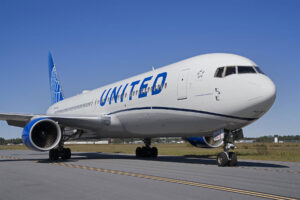Kirby's focus on 'D0' (on-time departure) -- what are your thoughts?
#136
A FlyerTalk Posting Legend
Join Date: Apr 2013
Location: PHX
Programs: AS 75K; UA 1MM; Hyatt Globalist; Marriott LTP; Hilton Diamond (Aspire)
Posts: 56,576
No, the best thing for UA -- and every other airline -- to do is to be flexible instead of focusing on one single metric. Sometimes, the best thing to do is to push the plane back on time, or early if everyone is already on board. Sometimes, the best thing to do is to hold the flight for a few minutes. Operations should have the ability to make that call on a case-by-case basis without having to worry that there will be blowback for their decision.
#137
FlyerTalk Evangelist
Join Date: May 2007
Location: Houston
Programs: UA Plat, Marriott Gold
Posts: 12,698
Yep - vastly outnumbered by non-misconnects, and lowers the probability of downstream misconnects.
#138
Join Date: Feb 2008
Programs: 6 year GS, now 2MM Jeff-ugee, *wood LTPlt, SkyPeso PLT
Posts: 6,526
Nonsense. First of all, with the exception of hub-hub flights, if you're waiting for inbound connecting passengers, you likely don't have any onward connecting passengers. Second, these hypothetical onward connecting passengers have a connection time baked into their reservation as well. Suppose UA holds for a group of passengers, and they estimate arrival will be ten minutes late because of it. If the estimate works out, nobody will misconnect at the destination.
But, most importantly, you're continuing to make the assumption that departing on time somehow equates to arriving on time. It does not. They're loosely correlated at best, which is the biggest reason that the D0 focus is silly. Perhaps there are favorable winds; perhaps UA knows that they'll be able to get an advantageous taxi time. Heck, perhaps there's a line of weather moving through and they'll be able to take a more direct routing if they start a little later.
No, the best thing for UA -- and every other airline -- to do is to be flexible instead of focusing on one single metric. Sometimes, the best thing to do is to push the plane back on time, or early if everyone is already on board. Sometimes, the best thing to do is to hold the flight for a few minutes. Operations should have the ability to make that call on a case-by-case basis without having to worry that there will be blowback for their decision.
But, most importantly, you're continuing to make the assumption that departing on time somehow equates to arriving on time. It does not. They're loosely correlated at best, which is the biggest reason that the D0 focus is silly. Perhaps there are favorable winds; perhaps UA knows that they'll be able to get an advantageous taxi time. Heck, perhaps there's a line of weather moving through and they'll be able to take a more direct routing if they start a little later.
No, the best thing for UA -- and every other airline -- to do is to be flexible instead of focusing on one single metric. Sometimes, the best thing to do is to push the plane back on time, or early if everyone is already on board. Sometimes, the best thing to do is to hold the flight for a few minutes. Operations should have the ability to make that call on a case-by-case basis without having to worry that there will be blowback for their decision.
pmUA Dispatch knows exactly the impact of a delay/not delay, and at least used to manage these issues balancing who was on the flight (VIP, high elites), availability of a back up flight, and total numbers that would be impacted, as well as any downstream issues. They IMHO did a good job.
United's management has made real mistakes in trying to apply a one size fits all mindset post merger, and a mindless focus on D0 is a perfect example. Yes, it has correlation to the arrival time, but only in a loose way. The result is relatively little impact on OT arrivals (vs focusing on the D10 or D15 or better yet looking at the entire picture) but rather large impacts on passengers.
You can certainly run a tight ship w/o applying arbitrary rules. E.g. DL certainly does not manage to D0, it instead applies the old pmUA approach of figuring out what works best for each flight. The announcement is made as it has been for time immemorial "well we are ready to go, but we are waiting on several late in bound passengers. But we will make up the time in flight and get you there OT"
And if someone is upset that the plane does not leave OT, so they get in early or wait for a gate when they arrive, well I could really care less. People who are that rigid deserve to be bothered.
#139
Join Date: May 2013
Posts: 3,361
- I don't think United, as a whole, has a myopic focus on one metric.
- It is difficult to argue against measuring the teams responsible for turning airplanes (above wing, below wing, maintenance, dispatch) with metrics fully in their control (e.g. D0).
- While D0 is first measured against the published departure time, it can also be measured against departure times that are rescheduled due to late arriving aircraft, weather, ATC, etc.
No, the best thing for UA -- and every other airline -- to do is to be flexible instead of focusing on one single metric. Sometimes, the best thing to do is to push the plane back on time, or early if everyone is already on board. Sometimes, the best thing to do is to hold the flight for a few minutes. Operations should have the ability to make that call on a case-by-case basis without having to worry that there will be blowback for their decision.
#140
Join Date: Feb 2008
Programs: 6 year GS, now 2MM Jeff-ugee, *wood LTPlt, SkyPeso PLT
Posts: 6,526
#141
Join Date: May 2013
Posts: 3,361
Yes, DL publicizes it�s A:14 performance. However, it compensates 3rd party ground handlers based on D:0.




















